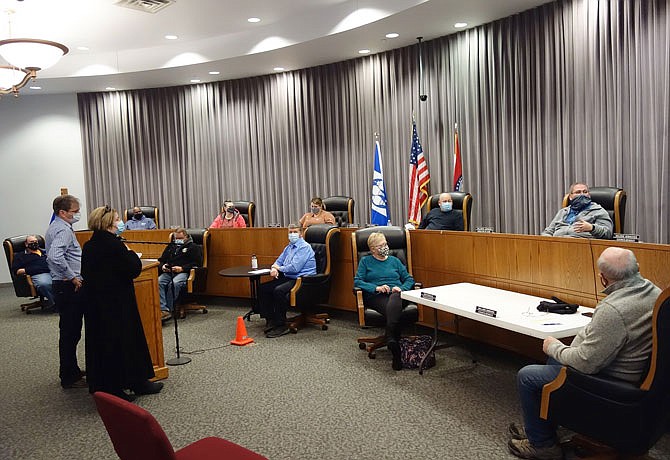The good news is the City of Fulton is no longer paying $225 per dekatherm for natural gas.
The bad news is the city will pay $132 per unit for today's natural gas while the frigid conditions that caused the price spike continue. Normally, natural gas costs the city $2.50-$4 per unit, but frozen natural gas wells have limited supply while demand stays high: a recipe for skyrocketing prices.
"What happens after tomorrow remains to be seen," Fulton chief financial officer Kathy Holschlag said.
On Tuesday night, city officials called an emergency meeting to fill City Council members in on the ongoing situation.
"We're here about the pending financial disaster we're facing with gas prices," Mayor Lowe Cannell said.
City Council members did not vote on any actions Tuesday. For now, Fulton customers will continue paying current natural gas and electricity rates for the city. And unlike some parts of Missouri and the nation, Fulton isn't facing rolling blackouts as energy providers try to reduce demand.
However, the city is facing an unprecedented strain on its natural gas fund.
The City of Fulton pre-buys about 75 percent of its natural gas at a fixed rate. The remaining 25 percent goes to the open market. When trading closed Friday, the city learned they'd be paying $225 per dekatherm - a price they were locked into over the long weekend. Fulton purchased 3,071 dekatherms per day over those four days, at a total cost of approximately $2.8 million.
Those four days brought the city's reserves from $5 million to $2.2 million. By the end of Wednesday, Holschlag expects the natural gas fund to shrink to $1.8 million.
Electricity prices have also gone up, though not by as much - so far, Fulton's drawn $140,000 from the electric fund. She said if high prices continue and the natural gas fund runs out, Fulton could borrow money from the electric fund.
"Obviously, our customers can't afford those exorbitant costs," she said.
Fulton Director of Administration Bill Johnson said it took around a decade for Fulton to build its monetary reserves. He noted Fulton's customers pay for around 700,000 dekatherms per year.
"If we raised the rate by $1 per unit, it would generate $700,000 per year," he said. Assuming all that money went toward rebuilding the natural gas fund, "It would take three years to get back to where we were a week ago."
Darrell Dunlap, Fulton's utilities superintendent, emphasized these prices are unprecedented. The region faced similar weather conditions during a polar vortex in January 2014. And though Fulton's customers set a usage record of 9,102 dekatherms on Jan. 6, 2014, costs during the weather event never went above $5.63 per dekatherm.
Johnson framed the issue as a natural disaster affecting a vast swath of middle America, from North Dakota to Texas.
"All these events are out of the peoples' control whose lives it effects, whose pocketbooks it effects," he said.
Call for help
The city asked residents and businesses Friday to cut back on natural gas usage if they can do so safely. A post shared to Fulton's Facebook page Tuesday repeated that plea.
However, the city is also asking residents to contact their state and federal elected officials to request a declaration of emergency.
"Such a declaration could assist in reducing the city's costs during this emergency," the Tuesday post stated.
Ward 3 city council member John Braun said he's reached out to U.S. Rep. Blaine Luetkemeyer, State Sen. Jeanie Riddle and State Rep. Travis Fitzwater and has received responses stating the politicians are aware of the situation.
Other potential avenues of relief include the invoking of the Natural Gas Policy Act of 1978, which allows the president to declare an emergency and set natural gas prices at the wellhead for up to 120 days.
Dunlap said the city has asked elected representatives to request a 10-day price freeze at $20 per unit.
"Twenty dollars would be a record high for the market a significant premium over the previous high level," Johnson said. "As I understand it, that's going to have to come from the president."
Additionally, he said, the Missouri Public Utility Alliance is investigating whether these surging prices could be construed as price-gouging.
Discussions about the issue will continue at the Fulton City Council meeting scheduled for 6:30 p.m. Tuesday.

